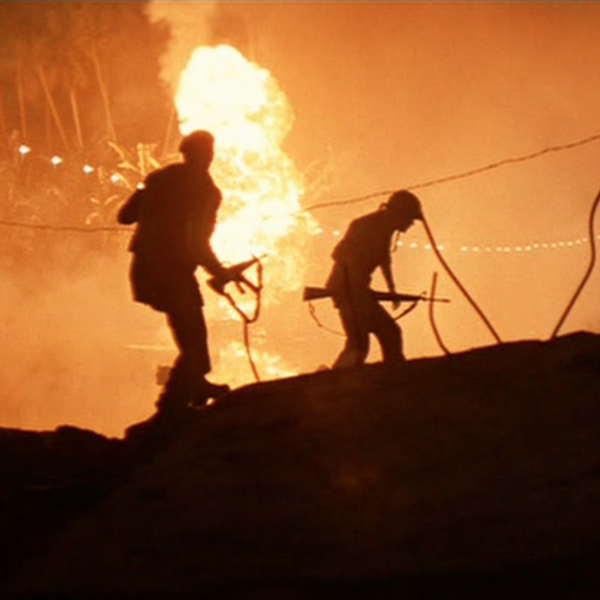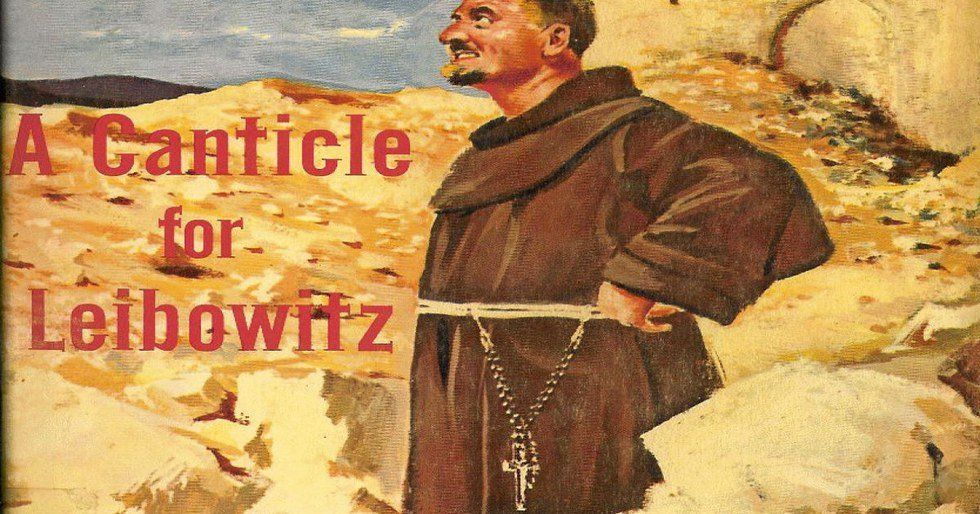A Canticle for Leibowitz uses the protagonist, Brother Francis Gerard, to examine the implications and discourses of science and religion. Through deliberate use of ideations of Faith, character foil, religious and scientific metaphor, along with death imagery Miller successfully extrapolates the careful balance that lies between the two poles of science and religion. His depiction of a dystopic universe left in the dark ages due to misuse of scientific knowledge without the moral compass that religion fosters offers an all too literal look at the devastation that can occur when one rules without the other.
As the novel’s first, and only true protagonist, Brother Francis Gerard is a symbol of unwavering Faith. His character serves as a wonderful contrast to the much more dark, and sinister beings within the novel. His faith in God and the supernatural is unshakeable—emblematic of the Christian ideal so many of his fellow Brothers and Abbots seek to achieve. Often times protagonists are all knowing, strong, and quick witted while Francis’ has frequent fainting spells in tough situations, making him more real than surreal as a character. Francis’ steadiness in his conviction of Faith stands as a symbol of the Christian ideal while also depicting him as fragile, drawing on the imperfection of humanity, and thus making him a more relatable character for the reader.
His true faithfulness is most clearly depicted when confronted by Abbot Arkos about whether the wanderer was real or something supernatural. Francis claims that, “there was no neat straight line separating the Natural from the Supernatural order, but rather, an intermediate twilight zone” (4.112). The implication of an intermediate zone between natural and supernatural reinforces that one cannot exist truly free of the other, a metaphor for the coexistence of science and knowledge. Further in the novel his Faith is again brought into question when Brother Jeris teases Brother Francis about his lack of knowledge of the blueprint; that he in fact doesn’t understand it although he wishes to preserve it. Francis responds, “I don’t know. But I have a certain faith that the ‘electron’ existed at one time, although I don’t know how it was constructed or what it might have been used for” (7. 83). The important inference here is that the word faith is used when discussing science—the inclusion of the two concepts reiterates the ideation that one cannot exist completely without the other. Likewise, Francis’ response can be compared to that of not being able to see or necessarily understand God’s love, yet believing it is there.
Continuing the theme of Brother Francis’ ever-moral devoutness is the character foil of Abbot Arkos which accentuates the differences between acting out of piety as opposed to greed which rules the majority of the dystopian universe they inhabit. Brother Francis wishes very badly for Leibowitz to become beatified, yet he refuses to enhance his odds through political games, contradicting Abbot Arkos’ actions. Francis tells his encounter of the wanderer without bias or inflation, unlike the rumors spreading about the wanderer’s identity secretly being Leibowitz. Arkos however, attempts to suppress the knowledge of the Fallout Shelter as well as Francis’ Lenten encounter so as to not increase Leibowitz’s chances at beatification.
Francis remains honest throughout his interrogations, and refuses to change his story even though Arkos keeps him from taking his vows for seven years (7.1). He also corrects Monsignor Aguerra’s story of the wanderer, removing the references to halos and heavenly choirs resulting in the loss of “miracle number seven” which could lessen Leibowitz’s chances at sainthood (8.65). His moral compass allows him to be free from the pull of societies’ politics, which not only sets him apart from just about every other character in the novel, but reinforces his piety in his Faith. Arkos, contrarily, comes to represent the corruption that occurs when politics and religion co-mingle, putting a spotlight on the ease and severity with which it can happen when they do. This foil serves as an allegory to the theme of the importance of individual morality.
Brother Francis’ character also serves as a metaphor for the coexistence needed between religion and science. The novel lends itself to the argument that scientific knowledge alone will not be enough. That science without a moral compass will unwittingly lend itself to humanities primitive impulses leading to utter chaos and destruction. Echoing the primitive nature of our races, “…Francis called by his own nature hungrily to devour such knowledge as could be taught in those days, and, because there were no schools but the monastic schools, he had donned the habit first of a postulant, later of a novice” (5.6). The word use “hungrily devour” leads the reader to think of the mutant cannibals who rely on basic instinct, and thoughtlessly are consumed by their violent desires.
The passage depicts the simplicity in giving into one’s temptations, not questioning the implications or impact they could inflict while simultaneously underscoring the importance of balance between instinct and morality. Likewise, to use an earlier example, Brother Francis uses the word Faith when discussing the existence of electrons. The utilization of both science as well as religion is integral to a cohesive environment and productive society. When the scales become tips or the two becomes wholly separate is when issues arise. Francis’ characterization carefully depicts that steadiness between employing both science and religion by being the only true protagonist in the novel.
The image of the human skull, though simple, is quite integral to the novel as it bookends the story. The first skull is happened upon by Francis while looking around the Fallout Shelter, “…still retaining a gold tooth in its grin” (2.12). The importance of the skull underscores the mortality of our race, the futility of our lives. Francis becomes frustrated at it, saying, “Why don’t you grin at something else for a change?” (2.16). By coming face to face with death, the skull not only foreshadows Francis’ impending death, but the inevitable mortality we must all face at one time or another. His frustration could be interpreted as an actual frustration with God for not revealing more answers during such a turbulent time, or his insecurity with his own mortality as it is staring back at him, which again serves to make Francis a more relatable protagonist while displaying his humanity, and humility.
The irony of the second skull at the end of the novel is that it is in fact Brother Francis’. The dying Zerchi blesses the skull, wondering what the owner had done for humanity and civilization before he had met his untimely end (29.66). More irony is added by this, as the nuclear war that is currently raging might not have been set in motion if Brother Francis had not found the Leibowitz Memorabilia. The full circle aesthetic of the novel despite the ambiguous embodiments of Leibowitz lends itself to the impression that without the balance of science and religion the war will rage on. The scales will tip, and chaos will ensue, irrevocably repeating itself until the intermediate can be met by the opposing ideations of science and religion in a constructive cohabitant way.
The theme of death and destruction is very apparent throughout the novel as basically everyone and everything ends up in nuclear brimstone. One large point that stands out in the aftermath of the novel is that the reader never encounters a death of any political figures or advocates of violence; only those who are neutral or oppose it. The certainty of death looming at the forefront for the entirety of the novel,
And the hate said: Let us stone and disembowel and burn the ones who did this thing. Let us make a holocaust of those who wrought this crime, together with their hirelings and their wise men; burning, let them perish, and all their works, their names, and even their memories. Let us destroy them all, and teach our children that the world is new, that they may know nothing of the deeds that went before (6.11).
The personification of Hate speaking the lines leads to the thought process of mass mentality centered on death and violence. Also, the futility of human life is once again employed by the nihilistic declaration, “that they may know nothing of the deeds that went before” destroying any shred of a life after death that people hope for, even if it’s only works or memories. The overwhelming ideation that nothing lasts, and nothing can last with the world how it currently is.
The proof of these words is enacted when Zerchi happens to find Brother Francis’ skull, wondering what the owner had done before he’d been shot in the head with an arrow. Francis’ legacy has been all but forgotten, yet his discovery was so integral to the future that became a reality for Zerchi, Mrs. Grales, and Thom Taddeo. Francis’ death served as a piece of foreshadowing to the nihilism that was to come. His death could also depict that although one lives a pious, devout life, it too will end like everyone else’s. The path to righteousness does not necessarily mean one gets better treatment in this life or after.
Brother Francis Gerard represents the idealistic intermediate zone that should peacefully exist between science and religion. Despite the overwhelmingly negative ambience of the novel, Miller employs Francis’ character to exemplify the alternative to a nihilistic world, and depict the importance that one cannot live without the other through use of death imagery, scientific and religious metaphor, as well as varying degrees and ideations of Faith. Miller’s implication of Francis being emblematic of both proper piety, as well as a successful coexistence of religion and science illustrate the hope that lies within utter destruction, and that there is always a solution despite the severity of the problem.





















